HAC News: May 27, 2015
HAC News Formats. pdf
May 27, 2015
Vol. 44, No. 11
• June is National Homeownership Month • House subcommittee considers USDA’s housing role • Section 533 Housing Preservation Grants offered • Pilot tests new area loan limit method for Section 502 direct • Rural rental properties urged to host meal programs • RD to reserve 10% of non-housing funds to aid development plans • Rents remain out of reach nationwide • More rural veterans are women • White House reports housing helps lift rural children out of poverty • Young people returning to rural areas most often cite family reasons • Rural Voices features lessons learned from housing mistakes • HAC disaster guide supplement for Oklahoma and Texas flooding available
HAC News Formats. pdf
May 27, 2015
Vol. 44, No. 11
JUNE IS NATIONAL HOMEOWNERSHIP MONTH. Watch HUD’s and USDA RD’s websites for announcements.
HOUSE SUBCOMMITTEE CONSIDERS USDA’S HOUSING ROLE. On May 19 the Housing and Insurance Subcommittee of the House Financial Services Subcommittee held a hearing entitled “The Future of Housing in America: Oversight of the Rural Housing Service.” RHS Administrator Tony Hernandez and Mathew Scirè of GAO testified. Questions from members of Congress focused on cost-effectiveness and the possibility of consolidating USDA and HUD housing programs.
SECTION 533 HOUSING PRESERVATION GRANTS OFFERED. Public agencies, nonprofits, tribes, consortia, rental property owners, and cooperative housing complexes can apply by July 6 for grants to repair or rehab owner-occupied or rental units. Contact Bonnie Edwards-Jackson, RD, 202-690–0759.
PILOT TESTS NEW AREA LOAN LIMIT METHOD FOR SECTION 502 DIRECT. RD state offices in CA, CO, DE, FL, HI, IA, MD, MN, MS, MO, MN, NV, NC, ND, OK, OR, SD, UT, WA, WV, WI, and WY may set area loan limits at 80% of FHA’s 203(b) loan limits. Updated limits (at the link, click the “Forms & Resources” tab) will be effective June 15, 2015. Contact an RD State Office.
RURAL RENTAL PROPERTIES URGED TO HOST MEAL PROGRAMS. An Unnumbered Letter dated May 5, 2015 asks local RD staff to encourage property owners and managers to reach out to local organizations that could operate Food and Nutrition Service offerings such as the Summer Food Service Program. Contact an RD office or an FNS regional office.
TENANT SERVICES CANNOT BE CHARGED TO MULTIFAMILY PROPERTIES’ OPERATING BUDGETS, RD SAYS. An Unnumbered Letter dated April 28, 2015 applies to Section 515 and 514 properties. Contact a USDA RD State Office.
RD TO RESERVE 10% OF NON-HOUSING FUNDS TO AID DEVELOPMENT PLANS. Comment by August 18 on an interim regulation for a program required by the 2014 Farm Bill. A portion of funds from specific community facilities, water and waste disposal, and business and cooperative development programs will be reserved each year for projects that help implement regional economic and community development plans. Contact Aaron Morris, RD, 202-720-1500. For FY15, eligible entities can receive priority points only for year-end pooled funds, according to a notice to be published in the Federal Register on June 1. Contact a USDA RD State Office.
RENTS REMAIN OUT OF REACH NATIONWIDE. The National Low Income Housing Coalition’s annual Out of Reach study found that nationally the housing wage – the hourly wage a person working 40 hours a week would need to afford a modest, two-bedroom rental unit – is $19.35. For a two-bedroom apartment in a nonmetro area the average housing wage is $13.48, almost $3 above the nonmetro renter wage. An interactive website includes data for states and counties.
MORE RURAL VETERANS ARE WOMEN. The percentage of rural veterans who are women has more than doubled since the First Gulf War, and they tend to be younger than the men, according to USDA’s Economic Research Service. In 2013, 55% of rural female veterans were under the age of 55 compared to 26% of rural male veterans. Racial and ethnic diversity among veterans is increasing as well. The Daily Yonder has republished a map showing the percentage of every U.S. county’s population who are veterans.
WHITE HOUSE REPORTS HOUSING HELPS LIFT RURAL CHILDREN OUT OF POVERTY. Opportunity for All: Fighting Rural Child Poverty states that programs like refundable tax credits, Social Security, SNAP, and housing assistance lifted about 9.0 million nonmetro residents out of poverty in 2013, including about 1.6 million children. In addition, aid programs provide long-term benefits by improving children’s education, health, and earnings outcomes later in life.
YOUNG PEOPLE RETURNING TO RURAL AREAS MOST OFTEN CITE FAMILY REASONS. Factors Affecting Former Residents’ Returning to Rural Communities, by USDA’s Economic Research Service, reports that some returnees said they made financial and career sacrifices to return home and other interviewees said those concerns kept them from returning. Housing costs were seldom mentioned.
RURAL VOICES FEATURES LESSONS LEARNED FROM HOUSING MISTAKES. A new issue of HAC’s quarterly magazine includes stories from rural housing professionals who share notable mistakes they or their organizations made. Sign up online for email notices when new issues are published.
HAC DISASTER GUIDE SUPPLEMENT FOR OKLAHOMA AND TEXAS FLOODING AVAILABLE.Picking Up the Pieces, HAC’s guide to housing recovery after natural disasters, and a special supplement for the recent floods, are available online. To order free print copies for people and organizations in disaster areas, contact Dan Stern, HAC, 202-842-8600.

